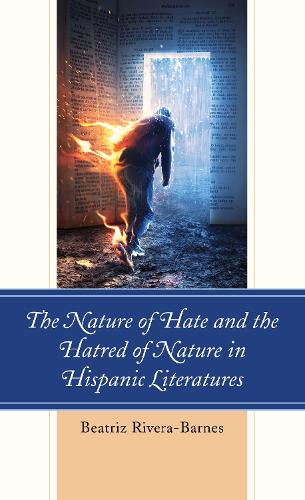
The Nature of Hate and the Hatred of Nature in Hispanic Literatures
(Hardback)
Publishing Details
The Nature of Hate and the Hatred of Nature in Hispanic Literatures
By (Author) Beatriz Rivera-Barnes
Bloomsbury Publishing PLC
Lexington Books
16th December 2020
United States
Classifications
Professional and Scholarly
Non Fiction
History of the Americas
Nature and the natural world: general interest
860.9353
Physical Properties
Hardback
242
Width 160mm, Height 239mm, Spine 21mm
490g
Description
The Nature of Hate and the Hatred of Nature in Hispanic Literatures retraces the nature of hatred and the hatred of nature from the earliest traditions of Western literature including Biblical texts, Medieval Spanish literature, early Spanish Renaissance texts, to nineteenth- and twentieth-century Iberian and Latin American literatures. The nature of hate is neither hate in its weakened form, as in disliking or loving less, nor hate in its righteous form, as in I hate hatred, rather hate in its primal form as told and conveyed in so many culturally influential Bible stories that are at the root of hatred as it manifests itself today. The hatred of nature is not only contempt for the natural world, but also the idea of nature hating in return, thus inspiring even more hatred of nature. While some chapters, such as the one dedicated to La Celestina, focus more on the nature of hate and the hatred of love, they do address the hatred of nature, as when Celestina conjures Pluto, who happens to be closer to nature than to Satan. Other chapters, such as the ones dedicated to the Latin American novels set in the jungle, focus more on the hatred of nature but ultimately turn to the nature of hatred by analyzing hatred and the descent into madness. In the final chapters Beatriz Rivera-Barnes simultaneously addresses the nature of hatred and the hatred of nature as well as the ecophilia/ecophobia debate in twentieth-century Latin American literatures and considers, if not an assimilation of hate, possibly the cannibalizing of hate.
Reviews
In The Nature of Hate and the Hatred of Nature in Hispanic Literatures Beatriz Rivera-Barnes has made of that execrable feeling called hate a fascinating object of academic study and a thought-provoking trope for the ecocritical reading of Western civilization.
-- Jos Manuel Marrero HenrquezAuthor Bio
Beatriz Rivera-Barnes is associate professor of Spanish at Penn State University.
